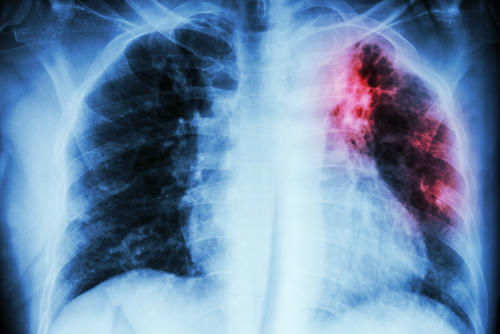Kadmon Holdings reported preclinical findings showing the significance of the ROCK signaling pathway in the development of pulmonary fibrosis (PF), supporting the development of drugs that inhibit this pathway as a potential treatment for the disease.
The results were presented at the 2017 Keystone Symposia on Injury, Inflammation and Fibrosis March 26-30 in Snowbird, Utah.
The ROCK (Rho-associated coiled-coil kinase) pathway mediates cell signaling of transforming growth factor beta (TGFβ), a regulator of wound-healing response that is fundamental for the good functioning of multiple body tissues.
Evidence has shown that ROCK plays a role in the development and progression of pulmonary fibrosis, a condition characterized by scarring of the lung tissue, leading to serious breathing problems. Scar formation, the accumulation of excess fibrous connective tissue (the process is called fibrosis), leads to thickening of the walls, and causes reduced oxygen supply in the blood.
ROCK inhibitors have been shown to prevent fibrosis. Kadmon scientists believe that by developing these inhibitors, they can prevent fibrosis progression while avoiding the adverse effects related to broad inhibition of the TGFβ regulator.
In their new experiments, Kadmon researchers developed small molecule ROCK inhibitors and evaluated their capacity to modulate cellular mechanisms seen in pulmonary fibrosis.
They found that the inhibition of the ROCK pathway blocks the expression of alpha-smooth muscle actin (α-SMA), the component of fibrosis-causing myofibroblast cells. In addition, they found that inhibiting the pathway reduced the activity of endothelial and epithelial cells, which contribute to the progressive organ injury related to fibrosis.
“These data demonstrate that ROCK inhibition blocks multiple cell signaling mechanisms that drive pulmonary fibrosis, including α-SMA expression and endothelial and epithelial cell function,” Masha Poyurovsky, PhD, vice president, head of molecular signaling at Kadmon, said in a press release. “By targeting ROCK, we can disrupt fundamental aspects of the TGFβ signaling pathway to potentially treat pulmonary fibrosis.”
Kadmon President and CEO Harlan W. Waksal, MD, said that through the company’s research platform, “we continue to establish the importance of ROCK signaling in fibrotic disease.”
“These findings further support the clinical development of our ROCK inhibitor KD025, for which we have three ongoing Phase 2 clinical trials, including in idiopathic pulmonary fibrosis [IPF],” he added.

